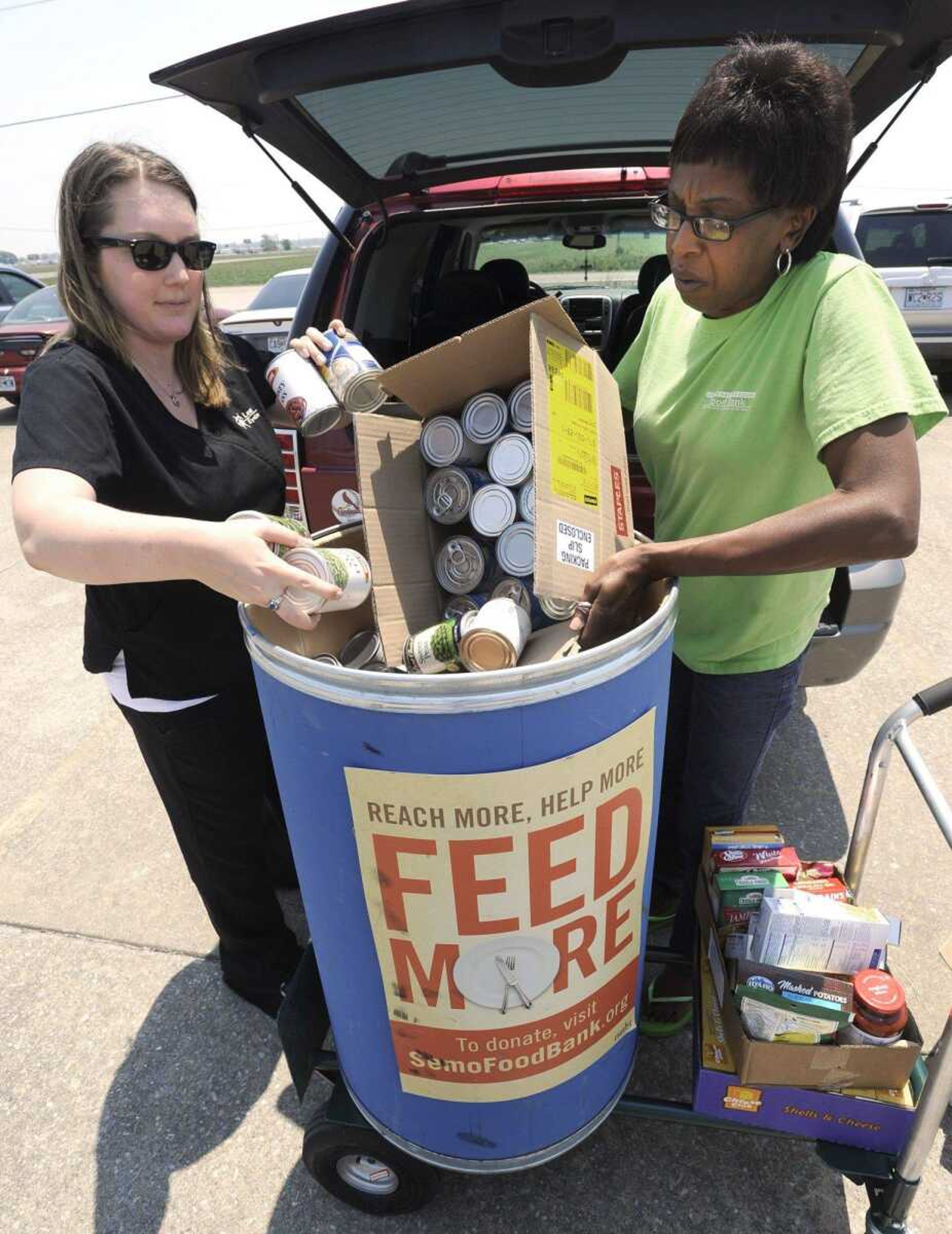Funds at risk: Once known as food stamps, SNAP provides food to poor
She used to work two jobs and made good money. Now a health condition keeps her from working full-time. So a 32-year-old Cape Girardeau single mom depends on the Supplemental Nutrition Assistance Program, formerly known as food stamps, to help her take care of her 3-year-old son...
EDITOR'S NOTE: Comments sent by the office of Sen. Roy Blunt, R-MO, were mistakenly not included in a story about the Supplemental Nutrition Assistance Program and the 2012 Farm Bill in Sunday's Southeast Missourian and online at http://www.semissourian.com/story/1865959.html. The comments follow:
"I'm pleased the Senate was able to work together to pass this bill, which takes steps to reduce the deficit and save taxpayers more than $23 billion overall. I'll continue looking for ways to reduce fraud and abuse in all programs, including nutrition programs, which make up nearly 80 percent of Farm Bill spending."
Original story
She used to work two jobs and made good money.
Now a health condition keeps her from working full-time. So a 32-year-old Cape Girardeau single mom depends on the Supplemental Nutrition Assistance Program, formerly known as food stamps, to help her take care of her 3-year-old son.
The $342 a month the woman, who asked not to be named, receives from the SNAP program could be cut as part of a plan to save taxpayer dollars and reduce fraud under the 2012 Farm Bill approved in June by the U.S. Senate.
The bill, known as the Agriculture Reform, Food and Jobs Act, provides subsidies to farmers and funds the USDA's nutrition assistance programs for low-income Americans.
The five-year bill includes a $4.5 billion cut to the SNAP program, expected to cause about 500,000 households to lose an estimated $90 per month in benefits. The entire farm bill passed by the Senate on June 21 includes $23 billion in spending reductions across several USDA programs.
Missouri's 8th congressional district has more SNAP recipients than any other in the state, with 44,858 households receiving assistance in 2010, according to the USDA Food and Nutrition Service. Statewide, 260,735 households, comprised of more than 900,000 people, received $1.4 billion in food benefits through SNAP in 2010. Missouri has a higher SNAP participation rate than two-thirds of the rest of the United States.
Because SNAP benefits are administered by each individual state, it's not clear how many Missouri recipients will be affected by the proposed cuts, but local agencies who work with those in need say this couldn't come at a worse time.
"Cutting nutrition programs that serve vulnerable, low-income families, children and seniors will undoubtedly increase hunger in Southeast Missouri and drive more people to food pantries that we serve at a time when we are already stretched," said Karen Green, executive director of the Southeast Missouri Food Bank in Cape Girardeau. "We simply cannot make up the difference."
Cuts to SNAP will target people who have no recourse to help themselves, said John McGowan, CEO of Love INC, a faith-based not-for-profit organization that works with local churches to help those in need.
"You're targeting the most needy that are already making decisions about whether to pay their light bill or buy their medication. This will push them from the brink of poverty to nearly destitution," he said. "The only help they have will be to turn to the community."
Community food pantries, including the Jackson Ministerial Alliance Food Pantry in Jackson and FISH Food Pantry and Christ Episcopal Church in Cape Girardeau are seeing record numbers of people coming for assistance and are already having to limit how many times people may come for help, McGowan said.
The Farm Bill does include a $10 million increase in funds for the Emergency Food Assistance Program, which assists food banks. While Green is thankful to see this bump up in funds, she says it will have a minimal impact due to the increasing number of people coming to food banks for assistance.
In 2010 the SEMO Food Bank served 40,000 people monthly, but last year that number increased to 55,000 people each month in the 16 Southeast Missouri counties it serves.
Supporters of the Farm Bill say the legislation will crack down on food stamp fraud, including the practice of selling one's SNAP benefits for cash, known as trafficking.
The most recent analysis from 2006 to 2008 indicated that trafficking diverted one cent of each benefit dollar, or about $330 million annually. The amount of benefits trafficked has been cut in half compared to 1998 when $660 million in SNAP benefits were estimated to be sold for cash.
"The role of the Farm Bill is to advocate for American producers and markets for U.S. agriculture so we can continue to enjoy the most abundant, affordable food supply in the world. It's also an important opportunity to re-evaluate nutrition programs and to make necessary changes to eliminate any waste, fraud and abuse. Congress must ensure these supplemental benefits go to those who truly need the assistance. Ensuring the integrity of our nation's nutrition programs will be an important priority for the House Agriculture Committee as they begin debating their bill," said Rep. Jo-Ann Emerson, R-Cape Girardeau, in a statement via email.
The Senate version of the Farm Bill also prevents lottery winners from receiving SNAP benefits and limits SNAP eligibility for college students.
The house is expected to take up the Farm Bill when members of congress return to Washington, D.C., after the Independence Day holiday break. According to Feeding America, a network of food banks that includes SEMO Food Bank, the House's version of the Farm Bill contains even deeper cuts to SNAP and reductions in other nutrition spending totaling $14 billion.
This includes a proposed cut to the Fresh Fruit and Vegetable Program, which several schools in Southeast Missouri participate in to provide students the opportunity to try fresh fruit and vegetables funded by USDA during the school day, Green said.
"Investing in hunger relief makes sense fiscally and is a cost-effective use of taxpayer dollars and an investment in our nation's future. Hunger increases health care costs, lowers worker productivity, harms children's development and diminishes their educational performance. These are costs that we cannot afford," she said.
Legislators are balancing the good work that a few rural farmers are doing against the huge demand of rural people who don't have the income possibilities that exist in urban centers, McGowan said.
Missouri Senators Claire McCaskill and Roy Blunt did not respond to requests for comments about the proposed SNAP benefit reductions.
mmiller@semissourian.com
388-3646
Pertinent address:
3920 Nash Road, Cape Girardeau, Mo.
Connect with the Southeast Missourian Newsroom:
For corrections to this story or other insights for the editor, click here. To submit a letter to the editor, click here. To learn about the Southeast Missourian’s AI Policy, click here.










